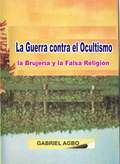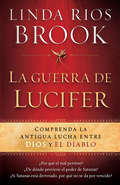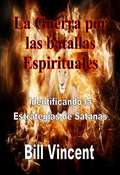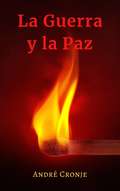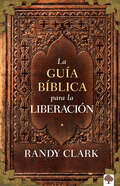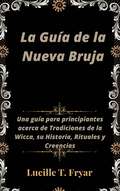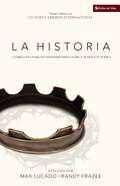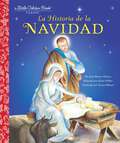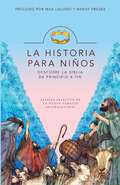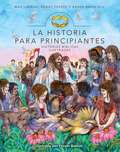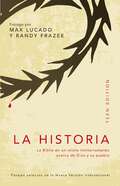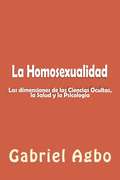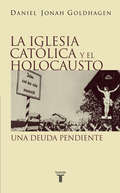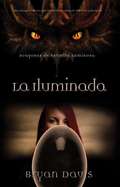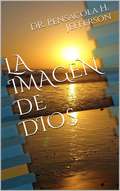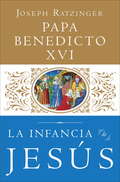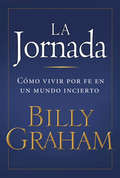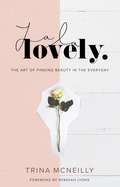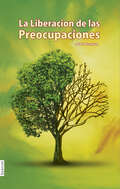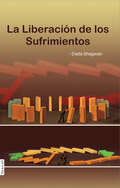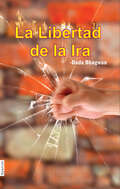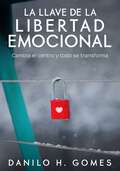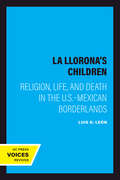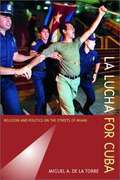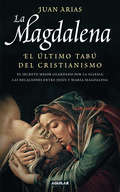- Table View
- List View
La Guerra contra el Ocultismo, la Brujería y la Falsa Religión
by Lilian G. Selvaggio Gabriel AgboEste libro es un trabajo sobre lo que yo llamo la trinidad del mal-el ocultismo, la brujería y la falsa religión. Estas son las agencias a través de las cuales Satanás lleva a cabo sus planes malvados contra el avance del reino de Dios y contra la humanidad. Estas tres ramas del reino de las tinieblas funcionan en armonía para lograr los objetivos mencionados. Satanás es el iniciador y está a la cabeza de cada una de ellas. Y siempre encontrarás al resto cuando cualquiera de ellas esté en acción. Es por eso que digo que son una trinidad. Por ejemplo, en el ocultismo también encuentras brujería y falsa religión. Los falsos profetas y los brujos usualmente pertenecen a sociedades y cultos secretos. Ellos simplemente se expanden de acuerdo a sus objetivos y acciones inmediatos. Son diferentes ramas del mismo árbol. Pero ¿cómo detendremos esta amenaza de siglos que ha causado tanto caos al hombre y ha tensionado la relación del hombre con su creador? Esto es lo que intentamos exponer aquí.
La Guerra de Lucifer: Comprenda la antigua lucha entre Dios y el diablo
by Linda Rios BrookAlgo terrible ha sucedido en nuestro mundoDos mil años después de la cruz el mal sigue maltratando y saqueando en cada nación, y nadie parece ser capaz de hacer mucho al respecto. ¿Por qué la iglesia ha hecho tan poco progreso? Aunque Satanás haya perdido su autoridad para dirigir la Tierra, no ha perdido su poder. Desconocer esto nos ha causado que no entendamos a que se debe la guerra sobre el planeta y por lo tanto, lo que debemos hacer para ganarla. La guerra de Lucifer examina en detalle a Satanás, los dioses demoníacos que están alineados con él y su lucha con Dios por la humanidad. Este libro cambiará su manera de orar, le equipará para comprender los tiempos que estamos viviendo y preparará para lo que pueda suceder.
La Guerra por las batallas Espirituales: Identificando la Estrategias de Satánas
by Bill Vincent VitoLa Guerra por las Batallas Espirituales está envuelta en muchos campos de las actividades de satanás. Empezaremos por ofrecer una visión verdadera del campo de batalla. Muchas veces para poder vencer en las batallas, necesitamos entender todos los aspectos del campo todas y cada una de las batallas. Comprender la motivación de satanás es revelar los secretos detrás de todo. Tan violenta como la guerra entre Dios y el demonio ha sido, y puesto que ha sido continua, no es eterna. Dios no tiene días iniciales ni finales. Él está desde lo eterno hasta lo sempiterno. Cuando usted lea este libro, podrá…Aprender como reconocer el campo de batallas de satanás. Encontrar a los motivos ocultos de los enemigos y todo lo que hace para detener a los Hijos de Dios. reciba revelaciones sobre los tópicos de la opresión y posesión del demonio y sea o no Cristiano, podrá enfrentar esas batallas de acuerdo con las escrituras. Obtenga la comprensión de la vestidura de la armadura entera de Dios. aprenda como la Gloria del Padre se puede manifestar en el medio de las batallas. Como vencer en el campo de batalla de la mente, sobreponerse a los temores y mucho más.
La Guerra y La Paz: Paz Para El Mundo
by André CronjeLA GUERRA Y LA PAZ Presenta más de 500 citas sobre la belleza de la paz mundial, la paz interior y la paz con Dios en medio de las cenizas de la guerra, los puentes quemados y las promesas incumplidas.
La Guía bíblica para la liberación
by Randy ClarkAcceda al poder y a la autoridad sobrenatural de Dios para vencer al diablo Muchas personas viven en esclavitud sin darse cuenta de ello. Los matrimonios están fracasando, las drogas están incontrolables, la pornografía se encuentra en todas partes y aun los cristianos han dejado de tener esperanza en Dios, en sus iglesias y en ellos mismos.La guía bíblica apra la liberación le brinda el poder y la autoridad sobrenatural para pelear cada una de sus batallas y ser libre de la opresión. Un libro práctico lleno de enseñanzas bíblicas, que le ayudarán a aprender cómo la liberación fue parte del ministerio de Jesús en el Nuevo Testamento, y cómo usted tiene acceso a ese mismo poder, lo cual le facultará para vivir libre de las cadenas del pecado. No importa qué situación esté atravesando, Dios le dará su gracia para que así pueda regocijarse en la libertad y vivir en la plenitud que Dios tiene para usted.
La Guía de la Nueva Bruja: Una guía para principiantes acerca de Tradiciones de la Wicca, su Historia, Rituales y Creencias
by Lucille T. FryarUna guía para descubrir tus poderes sobrenaturales. Tu compañero durante tu viaje a través de la esoteria y el mundo de la Wicca. "La Guía de la Nueva Bruja" se realizó con el obejtivo de ser un portal para aquellos quienes están interesados en las religiones basadas en la naturaleza. Es una guía básica que cubre todas las áreas fundamentales de la religón Wicca que todo principiante debe conocer. Ha habido un incremento en el número de personas interesadas en la brujería, las religiones de nueva era y la magia y este número sigue creciendo cada día. ¿Por qué repentinamente han aumentado las personas en la busqueda de conocimiento oculto? Existen varias razones y con los numerosos estilos de vida que podemos encontrar en la actualidad, es de esperarse que las personas busquen refugio en las religiones de la antiguedad. La era de la tecnología ha creado un abismo entre nosotros y la época en la que el hombre y la naturaleza eran uno mismo. Nos hemos dejado llevar por las pantallas y todos los "avances" que nos rodean, ignorando las maravillas de la magia de la naturaleza y lo sobrenatural que nos hicieron sobresalir como especie en el pasado. La Brujería Wicca nos ilumina y hace conscientes del simbolismo y los poderes de las estaciones. la naturaleza, la tierra, las hierbas y la magia. Esta magia se remonta a tiempos antiguos, antes de que cualquiera de las religiones abrahamicas se consolidara. Los Wiccanos tienen un estilo de vida, rituales y creencias que han trascendido a lo largo de los años. Su manera de vivir se ha extendido y mezclado con los tiempos modernos al mismo tiempo que sus doctrinas y creencias sagradas acerca de la naturaleza se han preservado. Esta religión representa el despertar y la iluminación en los cuales a hallarás tranquilidad y apoyo durante tu vida diaria. Algunos de los temas que cubre esta guía son: - La historia de la Wicca - Las festivi
La Historia NVI, ePub: La Biblia en un relato ininterrumpido acerca de Dios y su pueblo
by ZondervanLa mejor narración jamás contada» es más que simplemente un cliché. Dios ha hecho hasta lo imposible para rescatar a los perdidos y los que sufren. De eso trata La verdadera historia… del relato de la Biblia, el gran amor de Dios por la humanidad. Condensado en treinta y un capítulos accesibles, La verdadera historia le transporta hacia una progresión en desarrollo de los personajes y sucesos bíblicos desde Génesis hasta Apocalipsis. Usando el texto claro, preciso y fácil de entender de la Nueva Versión Internacional, permite que los relatos, poemas y enseñanzas de la Biblia se lean como una novela. Y como cualquier buen relato, La verdadera historia está llena de intriga, drama, conflicto, romance y redención. Características: • El relato bíblico… en sus propias palabras • Sucesos, personajes y enseñanzas de la Biblia ordenados de forma cronológica • Texto de la Nueva Versión Internacional
La Historia de la Navidad (Little Golden Book)
by Jane Werner Watson¡Por primera vez una edición en español de The Christmas Story, uno de los clásicos de Golden Books! La traducción al español de The Christmas Story —la venerada historia de la Natividad, ilustrada por Eloise Wilkin—brinda la oportunidad a más de 37 millones de hispanohablantes que residen en Estados Unidos de disfrutar de la maravillosa experiencia de leer este clásico de Golden Books. Traducida al español por una de las figuras más respetadas del mundo editorial hispano, y a la venta a un precio asequible, ¡será el regalo perfecto para Navidad! La edición en inglés, The Christmas Story, de la colección Little Golden Book, se publicó por primera vez a principios de 1950, y desde entonces ha vendido millones de ejemplares. Más de 37 millones de personas en Estados Unidos hablan español en sus hogares. El español, después del inglés, es la lengua más hablada en Estados Unidos entre personas a partir de los cinco años. La traductora, Teresa Mlawer, es una de las figuras más reconocidas y respetadas del mundo editorial hispanoamericano.
La Historia para niños: Descubre la Biblia de principio a fin
by Zondervan« ¡Aventura• Humor• Drama!» Los niños pueden descubrir ahora la historia del gran amor de Dios en un nuevo formato! Al leerla, usted podrá revelar ‹el plan completo›. Se dará cuenta que la historia de Dios no es solo una selección de aventuras escogidas al azar, sino que es una historia completa que habla del gran amor de Dios para su pueblo. Utilizando la Nueva Versión Internacional, La Verdadera Historia para Niños se lee como una novela. Los acontecimientos, los personajes, y las enseñanzas están organizados con el fin de mostrar el desarrollo de la historia de Dios. ¡La obra incorpora alegres ilustraciones y preguntas que invitan a la reflexión para que usted disfrute leyendo la mayor historia jamás contada!
La Historia para principiantes: Historias bíblicas ilustradas
by Max Lucado Randy Frazee Karen Davis Hill¡La Historia para niños no es solo otra colección de historias bíblicas. La Historia muestra un panorama del enorme amor de Dios por sus hijos! Presentado por el pastor y autor de éxitos de ventas Max Lucado, con Randy Frazee y Karen Hill, estas 48 historias muestran cómo Dios tiene una visión grandiosa y gloriosa, empezando con la creación y terminando con la promesa que Jesús regresaría. Cada historia está personalizada con el mensaje de Dios, y acompañada por ilustraciones vibrantes del consumado artista Fausto Bianchi, los cuales ayudan a darle vida a la Biblia para lectores jóvenes y adultos.
La Historia, teen edition: La Biblia en un relato ininterrumpido acerca de Dios y su pueblo
by Max Lucado Randy Frazee«La historia más grande jamás contada» es más que un cliché. Dios ha hecho todo lo posible por rescatar al perdido y a las personas heridas. Por eso es que La Historia para adolescentes es en su totalidad la historia de la Biblia, la gran historia de amor de Dios con la humanidad. Condensada en 31 capítulos accesibles, La Historia para adolescentes te cautiva en el desarrollo y la progresión de los personajes y sucesos de la Biblia desde Génesis hasta Apocalipsis. El usar el lenguaje claro, preciso y fácil de entender de la Nueva Versión Internacional, permite que las historias, los poemas y las enseñanzas de la Biblia se lean como una novela. Y como cualquier otra excelente historia, está llena de intriga, drama, conflicto, romance y redención.
La Homosexualidad: Dimensiones de las Ciencias Ocultas, la Salud y la Psicología
by Lilian G. Selvaggio Gabriel Agbo¿La homosexualidad es buena o mala? ¿Cuál es el origen de esta preferencia sexual y sus implicancias en la sociedad?¿ Estaba esto en el plan original de Dios (naturaleza)?¿ Quién está en realidad detrás de ella y con qué propósito?¿ Son los gays y lesbianas verdaderamente seducidos y atrapados por fuerzas invisibles? ¿Y cuáles serán sus efectos sobre las generaciones actuales y por venir? ¿Cuáles son las opiniones del Cristianismo, el Islam, la religión tradicional, etc, sobre el tema?¿ Qué tan peligrosos son el Sexo Anal y Oral-algún riesgo para la salud?¿ Pueden producir cáncer anal y oral y otras diversas infecciones? ¿Es la homosexualidad una práctica ocultista? Todas estas preguntas y muchas otras son las que estaremos tratando de responder desde este libro. La relación homosexual no es nueva para la humanidad, pero por algún tiempo ha estado ahora en la conciencia global, especialmente con el apoyo sistemático dado a ella por los líderes occidentales bajo el disfraz de derechos humanos, derechos homosexuales, derechos de las minorías, movimientos de coalición, etc. De hecho, algunos de los líderes y sus organizaciones fantoche no solamente la predican sino que presionan a otras naciones para que la acepten y las promuevan. Prometen ayuda social, subsidios y otros tipos de asistencia para el desarrollo, como compensación. Por qué están tan obsesionados con esto y de quién es esta agenda? En este trabajo trataremos de resumir nuestras discusiones muy objetivas, en los siguientes electrizantes, iluminadores e informativos siete capítulos: La Rebelión Gay, En el Principio, La Dimensión de las Cs. Ocultas, Las Implicancias sobre la Salud, Los Efectos Psicológicos, Las Consecuencias Evitables y Qué Debemos Hacer? Estas discusiones son verdaderamente muy informativas, hechos que te ayudarán a tomar una valiosa decisión acerca de involucrarte o no en la homosexualidad. La decision será completamente tuya.<br
La Iglesia católica y el Holocausto: Una deuda pendiente
by Daniel Jonah GoldhagenUna brillante indagación moral sobre la Iglesia católica que expone el papel de la misma durante el Holocausto y delinea los pasos que cree que ha de seguir ahora para reparar su culpa. En este libro Goldhagen plantea dos espinosas cuestiones. La primera es que el papa Pío XII fue «un colaborador nazi», comparable a Pétain y Laval en Vichy. Muestra que la complicidad del Papa y de la Iglesia en la persecución de los judíos fue mucho más allá de lo que habíamos creído hasta ahora. Los líderes de la Iglesia sabían perfectamente que se estaban llevando a cabo asesinatos en masa. No se declararon en contra, ni prestaron ayuda. Algunos clérigos incluso participaron en los crímenes. La segunda cuestión es que la autoridad moral de la Iglesia católica, desde los primeros tiempos hasta el presente, se ha visto profundamente desacreditada por su virulento antisemitismo. Goldhagen detalla y juzga la culpabilidad de la Iglesia y su clero. Y sugiere que debería deshacer el daño causado al pueblo judío para redimirse. Si la Iglesia se considera a sí misma una institución moral y quiere tener voz ética en el discurso público de la actualidad, tiene una deuda pendiente.
La Iluminada
by Bryan Davis¿Y si son ciertas las leyendas? Jason Masters dudaba de los mitos que hablaban de unos seres humanos que eran llevados a través de un portal a otra esfera, donde eran esclavizados por unos dragones. Pero cuando recibió un enigmático mensaje de su hermano perdido, comprendió que era necesario que descubriera la verdad y hallara el portal antes que fuera demasiado tarde. Al mismo tiempo, Koren, esclava junto con los demás humanos que se hallan en la esfera de los dragones, descubre que posee un don que lo mismo podría salvar, que ayudar a destruir a los suyos. Mientras Jason y Koren se esfuerzan por rescatar a los seres humanos esclavizados, una profecía mística acerca de un huevo negro habría podido hacer inútiles todos sus esfuerzos. En La Iluminada, el exitoso escritor Bryan Davis entreteje de una manera maestra la fantasía con la inspiración para crear una cautivante modela dirigida a los adultos jóvenes.
La Imagien de Dios
by Dr Pensacola H. JeffersonLA IMAGEN DE DIOS Con seguridad si preguntamos a la gente sobre el significado del hombre como imagen de Dios, nos encontraríamos con muchas respuestas, acertadas y equivocadas, pero ¿Qué es una imagen? Es una representación mental o visual que se tiene de uno mismo o de otra persona, y revela o muestra la semejanza exacta de una imagen en particular. Y ¿Qué es la “semejanza” de una imagen?” La semejanza de una imagen es una representación visual o mental, una idea o una descripción de algo o alguien. Pero la Imagen de Dios no es una representación mental o visual de Dios, sino una representación espiritual y proporciona una comprensión de su imagen. “…Dios es espíritu…” (Juan 4:24 RV1960) La Biblia dice que Adán fue originalmente creado a la imagen de Dios. Adán y Eva no eran Dios, pero fueron creados para tener la imagen de Dios, que es Espíritu, invisible, divina naturaleza, y poder eterno. “….hagamos al hombre a nuestra imagen, conforme a nuestra semejanza…” (Génesis 1:26 RV1960). Ahora, la imagen corporal es una representación mental del cuerpo. La autoimagen es una representación mental de sí mismo o de su identidad. Estas imágenes afectan la autoestima y la confianza de una persona. Tener la imagen de Dios significa ser restaurado por Dios a través de Cristo y tener todo lo necesario para producir fruto espiritual, revelar su presencia, representar la bondad de su carácter divino, y mostrar su poder eterno. “…a Su imagen….. “… De modo que si alguno está en Cristo, nueva criatura es...” (2 Corintios 5:17 RV1960). El propósito de ser restaurado a la imagen de Dios no es el simple hecho de saber quién eres “en” Cristo, sino conocer y experimentar quién es Cristo, cuando la imagen de Dios está de nuevo “dentro” de ti. La imagen de Dios no se trata simplemente de quién eres “en” Cristo, sino ¿Quién es Cristo cuando
La Infancia de Jesus
by Joseph RatzingerNew York Times Bestseller!El tercer transcendental y último volumen en la popular saga internacional "Jesús de Nazaret", escrito por El Papa, detallando como la historia de la infancia y niñez de Jesús es hoy por hoy aun tan relevante como fue hace dos mil años. En 2007 Joseph Ratzinger publicó su primer libro como Papa Benedicto XVI con el objetivo de "divulgar la figura y el mensaje de Jesús". En este volumen final El Papa se concentra exclusivamente en los Evangelios que cuentan la vida de Jesús cuando niño. En la raíz de esta historia está la vivencia por la esperanza encontrada con el nacimiento de Jesús y las afirmaciones de entrega y disposición encarnadas en sus padres José y María. Es una historia de anhelos y búsquedas, demostrada por los Tres Reyes Magos en la esperanza de redención traída con el nacimiento de un nuevo rey. Es un testimonio de sacrificio y confianza completa en la sabiduría de Dios visto a través de la fe de Simón, el recto y devoto vecino de Jerusalén, demostrada ante la presencia del Nino Jesús. En ultima instancia, la vida de Jesucristo y su mensaje es una historia actual que habla a la incansable búsqueda del corazón humano por la única verdad que es capaz, por si sola, de llevarnos a un profundo regocijo.
La Jornada
by Billy GrahamBilly Graham es querido y respetado en todo el mundo. Y este es su mágnum opus, la culminación de toda una vida de experiencia y ministerio.Capítulo a capítulo, Graham nos dirige en una jornada de fe. Aprenderemos acerca de Dios y de Su propósito en nuestras vidas; de quién es Jesús y de lo que ha hecho por nosotros. Aprenderemos a enfrentar los desafíos: la tentación; los malos pensamientos y las motivaciones, los hábitos que destruyen nuestro espíritu y qué hacer cuando la vida se vuelve en contra nuestra. También recibiremos el consejo práctico de la Biblia, en cuanto a la oración, conocer la voluntad de Dios, tomar las decisiones correctas, encontrar la comunión, reforzar nuestros matrimonios, ser padres sabios y usar nuestros dones para hablar de Cristo con los demás.Con el consejo que solo puede surgir de una vida dedicada a Dios, La Jornada está lleno de sabiduría, ánimo, esperanza e inspiración para cualquiera que quiera vivir una vida más feliz y más satisfactoria.
La La Lovely: The Art of Finding Beauty in the Everyday
by Rebekah Lyons Trina McNeillyThrough beautiful designs and imagery, LA LA LOVELY invites readers to find their true identity where there is brokenness, discover the love of God, and design their own special place of beauty. Author Trina McNeilly has been blogging for nearly a decade. While she spent her days sharing beauty, looking for lovely things, and redecorating her childhood home, her parents' unexpected divorce shattered her ideals of "home."Through this journey, Trina learned that beauty is not beyond the laundry pile, chipped paint, dirty dishes, broken table or broken life. It's right in the center of it. Trina found that God IS beauty. And that he invites us to look, discover, uncover and find because when we find beauty, we find God. In LA LA LOVELY, Trina shares stories and inspiration from her journey of finding, and being found, by beauty. You will find deep matters of the heart along with practical pointers on things like decorating your home, finding your style, and creating beautiful spaces. Each chapter offers essays, beautiful photographs, design tips, and practical advice for creating a place of beauty and belonging no matter where you live or what you're going through.
La Liberacion De Las Preocupaciones
by Dada BhagwanEl trabajo se echa a perder con las preocupaciones, esta es la ley de la naturaleza. La libertad de las preocupaciones mejora el rendimiento en el trabajo. Las personas mejor educadas y de mejor posición sufren de altos niveles de estrés y de preocupación. Comparativamente, los trabajadores no se procupan tanto y pueden dormir bien, mientras que sus jefes tienen que tomar pastillas para poder pasar la noche. Aquellos que se preocupan pierden su fortuna. Aquí tienen un pequeño ejemplo en las palabras del Param Pujya Dadashri (maestro de esta ciencia espiritual), con las cuales nos cuenta cómo él acabó con todas las preocupaciones que le daba su negocio. “Hubo una vez en que nuestra empresa tuvo una fuerte pérdida. Todo esto sucedió antes de que yo tuviera el Gnan (antes de la Realización del Ser). Cuando eso ocurrió no paraba de preocuparme y me quedaba despierto toda la noche. Pero, entonces recibí una respuesta de mi interior: “¿ a quién más le preocupaba en ese momento esa pérdida?” Sentí que mi socio no se preocupaba tanto como yo y me di cuenta que era el único que estaba de verdad preocupado.Aunque mi esposa e hijos eran todos socios del negocio, ellos tampoco sabían nada sobre el asunto.Incluso, en ese momento, todo iba bien para ellos a pesar de no saber nada sobre esto.Yo era el único tonto que se preocupa.Cuando los demás que son también mis socios no les preocupaba esto para nada ¿por qué iba yo a llevarme la peor parte? ¿Qué es la preocupación? Los pensamientos no son en si el problema.Es sólo cuando uno se implica emocionalmente en los pensamientos cuando surgen todas las preocupaciones. Uno puede dejar de procuparse si uno comprende el verdadero conocimiento de “quién es el hacedor”….seguir leyendo para ver cómo liberarse de las preocupaciones...
La Liberación de los Sufrimientos
by Dada BhagwanSi una persona sufre, es a causa de sus propios errores. Si una persona es feliz es por el premio de sus buenas obras. Pero la ley del mundo acusa al “nimit” (el hacedor aparente, la persona que inflige el sufrimiento).La ley Divina pilla al verdadero culpable. Esta ley es exacta y nadie puede cambiarla. No hay ley en este mundo que pueda infligir sufrimiento a nadie, ni siquiera la ley del gobierno. Cada que vez que tenemos que soportar el sufrimiento, cuando no hay falta aparente de nuestra parte, nos sentimos heridos y nos preguntamos ¿por qué yo? ¿Dónde estoy equivocado? ¿De quién es la falta?¿Es la falta del ladrón o del que ha sido robado? Si quieres saber de quién es la falta en este mundo encuentra al que sufre. ¿Cuáles son las causas detrás de tu sufrimiento? Param Pujya Dadashri (Maestro de esta ciencia espiritual) nos ha dado la esencia de todas las escrituras y nos dice con exactitud como es la justicia de la naturaleza en este libro “La falta es del que sufre”
La Libertad De La Ira
by Dada BhagwanUno generalmente se irrita cuando las cosas no salen a su manera, o cuando la otra persona no lo comprende o cuando tiene distinto punto de vista. A veces nos enojamos cuando nos acusan de estar equivocados. Pensamos que estamos en lo correcto por nuestra percepción, la otra persona piensa lo mismo, a menudo ocurre cuando no tenemos ni idea de que hacer después, no se les ocurre el por qué estamos enojados. Destruimos nuestras relaciones con las personas que mas amamos. Queremos dar soporte a nuestros hijos, confort y un hogar seguro pero nuestra ira los asusta en su propia casa. ¿Cómo lidiar con personas iracundas? Cuando una maquina se calienta demasiado, debes dejarla sola algún tiempo y en poco tiempo se enfriará. Pero si te entrometes te quemaras.
La Llave de la Libertad Emocional: Cambia el centro y todo se transforma
by Danilo H. GomesLlegó la hora de entrar a los niveles más profundos de la mente para concertar un error central. Quizás tengas un estilo de vida problemático, lleno de altibajos, justamente por no saber qué es lo que ocupa el centro de tus pensamientos. ¿Has examinado tu mente así tan profundamente? LA LLAVE DE LA LIBERTAD EMOCIONAL, te llevará a reflexionar de manera profunda sobre la raíz de tus comportamiento y emociones. Esta poderosa investigación mostrará lo que hay de errado en el centro de tu manera de pensar y te brindará herramientas útiles para superar secuelas y cambiar el rumbo de tu padrón de pensamiento. Encuentra la llave correcta para abrir tu corazón y restaurar lo que te llevó al desequilibrio. Aprende sobre: Egocentrismo; Exagerada empatía; Hábito de comparación; Ansiedad; Liberación del pasado; Entre otros temas.
La Llorona's Children: Religion, Life, and Death in the U.S.–Mexican Borderlands
by Luis D. LeónLuis D. León's compelling, innovative exploration of religion in the U.S.-Mexican borderlands issues a fundamental challenge to current scholarship in the field and recharts the landscape of Chicano faith. La Llorona's Children constructs genealogies of the major traditions spanning Mexico City, East Los Angeles, and the southwestern United States: Guadalupe devotion, curanderismo, espiritualismo, and evangelical/ Pentecostal traditions. León theorizes a religious poetics that functions as an effective and subversive survival tactic akin to crossing the U.S.-Mexican border. He claims that, when examined in terms of broad categorical religious forms and intentions, these traditions are remarkably alike and resonate religious ideas and practices developed in the ancient Mesoamerican world.León proposes what he calls a borderlands reading of La Virgen de Guadalupe as a transgressive, border-crossing goddess in her own right, a mestiza deity who displaces Jesus and God for believers on both sides of the border. His energetic discussion of curanderismo shows how this indigenous religious practice links cognition and sensation in a fresh and powerful technology of the body—one where sensual, erotic, and sexualized ways of knowing emphasize personal and communal healing. La Llorona’s Children ends with a fascinating study of the rich and complex world of Chicano/a Pentecostalism in Los Angeles, a tradition that León maintains allows Chicano men to reimagine their bodies into a unified social body through ritual performance. Throughout the narrative, the connections among sacred spaces, saints, healers, writers, ideas, and movements are woven with skill, inspiration, and insight.
La Lucha for Cuba: Religion and Politics on the Streets of Miami
by Miguel A. De La TorreThis book examines the fiery interplay of religion and politics among Miami's Cuban exile community.
La Magdalena. El último tabú del cristianismo: El secreto mejor guardado por la Iglesia: las relaciones entre Jesús y María Magadalena
by Juan AriasJuan Arias nos ofrece en este libro una hipótesis muy bien documentada: La Magdalena vivió con Jesús una apasionada historia de amor. María Magdalena fue la mujer escogida por Jesús de Nazaret como primera destinataria de sus revelaciones y los secretos de su sabiduría, y el entorno de Jesús no entendió por qué confió a ella secretos que escondía a sus discípulos más cercanos. Según los evangelios, Jesús resucitado apareció ante ella en primer lugar y, como mensajera, la envió a comunicar la importante noticia a Pedro y a los demás apóstoles, escondidos y atemorizados tras la crucifixión. Desde los orígenes del cristianismo se tejió en torno a María Magdalena una tupida red de leyendas y falsedades. La intención podría haber sido ocultar su verdadera identidad y quizá rebajar o eliminar el papel fundamental que ella debería haber tenido y no tuvo en la fundación de la nueva religión. La Iglesia siempre tuvo miedo del personaje, puesto que, a juzgar por los textos, María de Magdala aparecía asociada afectivamente a Jesús y este hecho podría hacer tambalear los cimientos de la institución.
